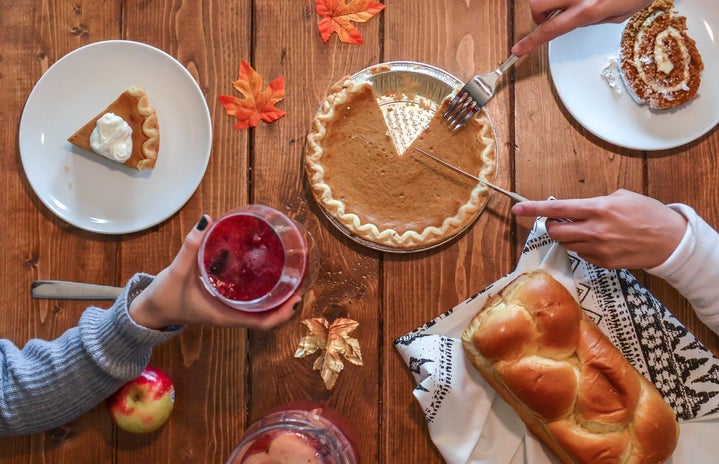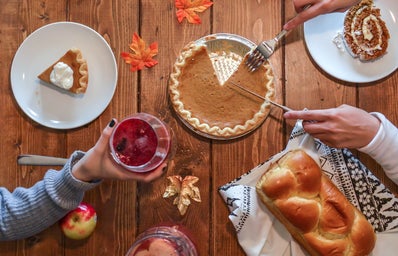Trigger Warning: Brief mention of eating disorders and disordered eating. Please check in with yourself before reading.
As we get deeper into November, we have so much to look forward to with the holidays approaching. Time with family, a break from classes, maybe even some fun vacations! But with holidays comes food, which can be wonderful and exciting for some, but can cause immense anxiety and fear for others. Food is a touchy subject and many of us, especially women-identifying folks, may not have the best relationship with it. The holidays and time with family can be very triggering, so I am here to give you some tips on how to say no to diet culture this holiday season!
- Don’t compare your plate to those around you.
It can be hard to avoid looking around the table at what your family members have on their plates. You may feel pressure to have more vegetables instead of extra stuffing, or to have less on your plate than other relatives. It is hard, but it is important to make your best effort to not fall into this trap. Comparison is the thief of joy, especially in the context of food. You deserve to enjoy whatever food you are craving without being concerned with the food on other people’s plates.
- If you want seconds, get seconds! If you don’t, then don’t!
You don’t owe any explanations to anyone about how much or how little food you put on your plate. If you finish a full plate of food and decide that you want more, go get more. If you finish what’s on your plate and decide that you’ve had enough, then don’t get any more. If a relative comments on whether you get seconds or not, try your best to ignore them and remember that they are projecting onto you. You are not responsible for their own insecurities around food.
- If someone says something triggering, let them know.
Sometimes family members mess up, whether it be out of love or out of judgement. If you have a strong enough relationship with a family member who says something triggering to you, let them know. You don’t have to go into depth about your relationship with food if that makes you uncomfortable, but try to gently remind them that you don’t enjoy other people commenting on what and how you eat. Say something like, “Aunt Sally, I know you didn’t mean anything by that comment, but it makes me uncomfortable when other people comment on the food I eat. I’m not upset, I just want to let you know.” Aunt Sally will likely appreciate your open communication and hopefully won’t make the same mistake again.
- Cover your Instagram feed with accounts that bring you joy.
Social media can be incredibly toxic, but it can also be inspiring and motivating. I recommend only following Instagram accounts that make you feel good in your body and support your body acceptance journey. If social media overall is negative for you, then go on a social media cleanse to jumpstart your healing journey.
Here are some accounts I follow that have helped me a lot in my eating disorder recovery journey:
- Workout to feel good, not to look a certain way.
Moving your body and working out is wonderful, but only when you are doing it for the right reasons. Do physical activities that bring you joy rather than doing workouts to look a specific way. Even just going on a short walk is a great way to get gentle, healthy movement into your day. I also recommend yoga. If you have a lot of energy and want to challenge your body, try power yoga. If you are tired and need to relax, do some gentle stretching and meditation based yoga.
- Don’t do any crash diets after the holidays.
If you have any sort of complicated relationship with food or history of disordered eating, it is likely that all the food over the holiday season is super overwhelming. I encourage you to give yourself permission to indulge in all of the delicious dishes and meals you encounter during this time without crash dieting, overexercising, or restricting afterward. There is nothing wrong with enjoying food and in order to improve your relationship with it, it is essential that you continue to nourish your body after what may feel like overindulging.
- Ignore early January workout and diet plans and just keep doing what you usually do.
Late December and early January are filled with a multitude of damaging, unhealthy, and destructive diet and workout plans. If you enjoy making New Year’s Resolutions, go for it! But don’t set goals or resolutions around your physical appearance. If you want to work on eating healthier or exercising more, frame your goal around how you feel and what you are capable of instead of what you look like. For example, instead of: “I want to get a six pack by the end of May,” try: “I want to be able to hold a one minute plank by the end of May.”
- Find a loved one who can relate to your struggle and connect with them.
Whether it’s a friend, sister, or cousin, it is likely that someone close to you struggles with food too. Being able to confide in someone else who truly understands what you are going through can be incredibly helpful, especially when so many triggers arise during the holidays.
- Practice mindful eating.
This tip applies to the holidays, but it also applies to everyday life. We often eat in a rush between classes or on a short 15 minute break from work. During this time when you are away from school and work, take the opportunity to eat mindfully and really savor the food you have the opportunity to eat. This can be challenging, especially the first time you try it, but as you practice it more, it is so rewarding.
- Ask for help if you need it.
Lastly, and most importantly, if you need help, whether it be the development of a new eating disorder or habits that have been triggered from all the food the holidays offer, reach out to someone you trust. There are resources on campus and national organizations that you can reach out to if you don’t feel safe to open up to a family member or friend. Know that you are loved and you are not alone.
Resources:
https://www.colorado.edu/counseling/services/eating-concerns
https://www.nationaleatingdisorders.org/help-support/contact-helpline


